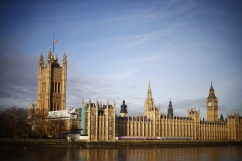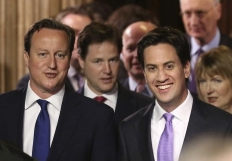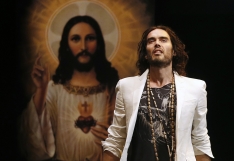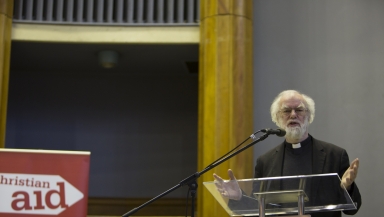
It would appear that at the moment a week doesn't go by without some form of conference or event where the subject of Christianity and politics are thrown together. As someone who has made a commitment to studying and discussing the matter on a regular basis, I have to say that I am greatly encouraged. As we head towards this year's General Election, a growing movement is taking shape: the widespread involvement of Christians in politics, which has played such a crucial part in defining this nation's history, is being rediscovered with a new found passion and vigour.
This Saturday saw the turn of Christian Aid, the Children's Society and Greenbelt coming together for their first Faith in Politics? conference at London's City Temple.
As with anything involving political opinions, there were bound to be a few disagreements and disputes during the day and Ukip was certainly targeted on several occasions. Rev Giles Fraser, never one to hide his left-wing fervour, commented that "Nigel Farage wouldn't recognise a Judaeo-Christian value if it bit him on the bottom". The former Archbishop of Canterbury, Dr Rowan Williams raised this too during his keynote speech. He talked of the 'Ukip factor' where a minority sets the agenda – in this case immigration – and the other parties respond by competing to be perceived as tougher than their neighbours. The result is an increased and unsubstantiated rise in anxiety that spreads with great ease. Dr Williams said there was a real need to deal with the "stupid stereotypes" that people live with. To counter these views he called for a theological anthropology from Christians, ie a restoration of trust in our fellow humans rooted in God's trust in us.
However despite the bashing of Ukip, the most controversial topic of the day had nothing to do with the usual concerns that our politicians fight over. Instead it was whether or not Jesus would vote.
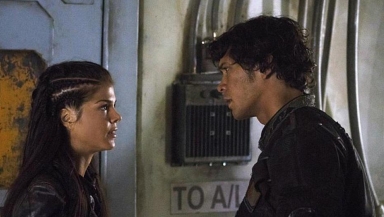
Giles Fraser was in no doubt: "Obviously yes," he said. "I'm even puzzled why we would ask the question in the first place. Jesus was fully human, fully involved in the politics of his day." Colin Bloom, Director of the Conservative Christian Fellowship and also on the panel disagreed: "The answer that I have is that I don't know. For nearly 2,000 years men and women standing on a soap box, holding a microphone or writing a blog have sought to speak for Jesus Christ in that kind of way. What we can speak about is this: What would his followers do and what should his followers do? And I think without any question that they should vote. If they have the opportunity to exercise a democratic vote then they should. Then it comes down to what kind of party should they vote for and what sort of person they should vote for. I'm pleased to tell you there are Christians in all parties and we mustn't get seduced by the lazy narrative that says somehow Christianity is the preserve of one political party or one way of thinking."
Fraser later responded: "I find it odd that you think that Jesus would be above the fray, beyond this conflict of party politics. The idea that [Jesus] walks five foot above where the rest of us walk and wouldn't get his hands dirty involved in the messy business is actually a renunciation of the incarnation. The whole point of God becoming fully human is that God is fully involved in the plumbing of our lives and that is politics... This could be actually leading to the conclusion 'vote Tory' – it isn't." And so the debate went on...
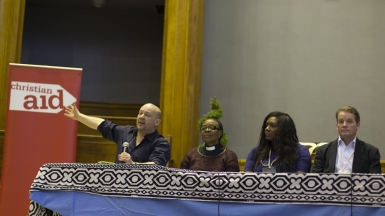
Talking about whether Jesus would vote is of course hypothetical and at one level pointless; democracy didn't exist in first century Palestine. On another level though, the conclusions we reach can potentially impact our attitude towards politics. A report published last month by the Evangelical Alliance found that 62 per cent of respondents thought Jesus would vote, which shows that there is certainly no great consensus, at least among evangelicals.
My personal opinion is that although Jesus would be engaged, he wouldn't vote. As the theologian NT Wright recently said: "The question of whether Jesus would have voted is rather like asking whether the referee is allowed to score a goal in a football match." Jesus was fully human and also fully divine. I don't see how God in Jesus could align himself through the ballot box to one party, which then could potentially claim to have God on their side. Every political party is flawed and none is perfect when it comes to truth and justice. How could Jesus' purity be contained within manmade structures?
However, the danger with this line of thinking is that if we are to follow Jesus' example then Christians can justify setting themselves apart from the political process as no party comes close to Jesus' standards.
But we are not God and that makes things very different. We in effect have two votes. One is for who we allow to reign in our lives and the other is who should govern our country. If we give our vote to Jesus and follow him then we have a duty to do our bit to bring God's kingdom values into the world. When it comes to poverty, injustice, freedom and respect for each other, our democracy gives us the opportunity to edge things in the right direction.
Winston Churchill once said: "Democracy is the worst form of government, except for all those other forms that have been tried from time to time." In the heavenly kingdom God is in charge and that is everything we need. On earth things are very different. Democracy isn't perfect, but we could certainly do a lot worse. It's what we have and we need to make the most of it. As we think about who deserves our 'X' at the ballot box, or indeed what our wider level of interaction with the political process could be, our job should not be to ask 'Would Jesus vote?', but using our faith as a foundation ask the simple, yet more challenging question: 'How can I play my part?'
Gillan Scott regularly writes about the relationship between Christianity and society. He is deputy editor at www.archbishopcranmer.com and founder of the God and Politics in the UK blog www.godandpoliticsuk.org










